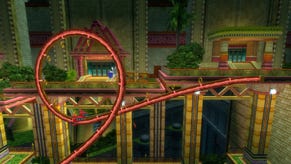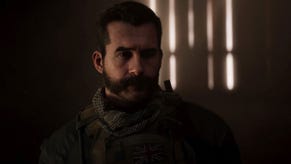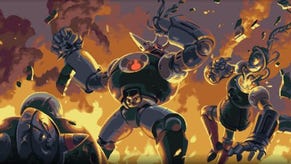Call Of Duty: Infinite Warfare Story From Comic-Con
Brendy posted about the 12 minutes of Call Of Duty: Infinite Warfare [official site] footage over the weekend but I've been watching the narrative panel from San Diego Comic-Con in which it also made an appearance to just get a feel for what Infinity Ward are up to with this next instalment and what exactly is up with the space plot:
The whole thing is nearly an hour long so if that's too much Call Of Duty for you to handle on a Monday morning I can break down the bits which stood out to me. Oh, and this was a narrative panel so I'll pre-empt the first question by saying: no, nothing about zombies or multiplayer unless you count talk of the MW2 Terminal map reimagined as a moon-port instead of an airport which is only mentioned at the very end in the service of selling the pre-orders for the game.
OKAY.
So, the plot revolves around this idea that a separatist movement has developed in space and they are hell-bent on destroying Earth-dwellers. That's the short version. The long version is about how the Earth's natural supply of things like tin is dwindling so we've had to go mining for them in space. Space has made people go a bit space-weird as they go through a prolonged period of being away from humanising structures which exist on Earth.
The general gist is that because resources are scarce they're the focus of a lot of money and a lot of potential for conflict - I'm assuming that the Space Jerk Faction (who are actually called the Settlement Defence Front, or SetDef) feels that they deserve the tin mines more than the people on Earth or they want to control them or something. That part is a bit hazy because the impression the panel gives is that the Space Jerk Faction just wants to obliterate Earth, which... I guess?
I mean, eradicating everyone on Earth would eradicate the competition for space tin. It also makes for a more bombastic game where the evil guy wants to kill everyone on earth rather than, say, set up a blockade around an asteroid and negotiate for advantageous trade agreements and financing.
Incidentally, Kit Harington is playing your nemesis here. A guy called Salen Kotch. He is in the panel briefly via a pre-recorded interview segment. Harington describes Kotch as "psychotic and unpredictable" as well as not being afraid of death. Honestly? I didn't get anything but cliché villain traits from this.
Anyway, SetDef launches an attack on the Earth fleet when they all gather in one place for a celebration. I feel like it's Military 101 to not put your entire fleet in one place but what do I know? Now there are only two ships left (and lots of little Jackals which are the ships whice can fly in space and in the atmosphere on Earth and apparently use FPS-ish controls). They/you need to buy Earth time so Earth can rebuild the fleet.
Thoughts:
My first thought is that there's a lot of talk about how you are the captain here and get to make choices, but the 12 minutes of footage didn't really offer up anything that looked particularly choice-y. I think maybe there was a bit of telling people to use particular tactics but mostly it was Call Of Duty run and gun from scene to scene as far as I could see.
A potentially interesting thing is that your promotion to captain means this is the first time you're space partner, Nora Salter's superior. Apparently there's dialogue in the game that acknowledges the discomfort that shift in dynamic brings. That sounds interesting just as a kind of rounding out of characters but it didn't seem present in what was shown so no idea if it will actually play out in a cool way or just as an idea that gets talked about on panels but doesn't really manifest in-game.
Another idea that was interesting was the robot/android companion soldier called Ethan. It has apparently been programmed with a sense of humour to help it fit in. This isn't a new idea, but it's one I've always found interesting - AI ability to make and understand jokes and how it affects interactions with humans. I'm not sure how that is ultimately going to affect the game interactions apart from adding a bit of levity at points. I mean, in the panel they explicitly point out that David Harewood's foot soldier/marine kind of character doesn't like Ethan so the addition of humour doesn't seem to be doing a job there?
BUT the whole area of artificial intelligence and whether it can successfully engage with or produce humour is fascinating so this is my way of saying GO DISAPPEAR DOWN A RABBIT HOLE OF ROBO-LOL RESEARCH... This piece over on Wired is an interesting jumping-off point. The implications for how far computing or AI design will have come if Ethan actually existed and was making off-the-cuff quips to respond to situations are kind of mind-boggling.
Unless Ethan just turns out to be a variation of the "That's What She Said" bot. Although, to be honest, I've had human colleagues who would fill that description, and with a similar percentage accuracy.
What else?
The crew in some segments wears colour-coded jackets so you can tell their role at a glance. This is useful to people aboard an aircraft carrier IRL, but mostly I was thinking about how each member of JLS has their own signature colour. I have no idea how the coding works in the military but in JLS Marvin was green, Oritsé was red, Aston was blue and JB was yellow.
There were also some interesting bits about how redundancy is built into actual military constructions - a touchscreen communication device being backed up by a corded telephone which is backed up by a tube you can literally just shout into.
I guess that last thing I was left pondering actually came up only a few minutes into the panel. Co-writer Brian Bloom (who also plays the main character, Nick Reyes) said of the space setting:
"This is the natural progression. When you sit and talk to a real life top gun pilot and say 'Where's this going, what do you want?' - because that's the most awesome job in the world - 'What's the next step for you?' They say that next step is space. That's the new frontier, that's the next frontier, that's the next battleground."
To me that's so disturbing as a thought. Perhaps I've watched too much Star Trek, but my relationship with space posits it as this amazing, expansive, perspective-shifting thing. Something where people can share and co-operate. Maybe that's also a consequence of having grown up well after the post-war space race and very much in the era of International Space Stations and ideas about advancing human knowledge. I hate the idea that space is viewed as another set of borders to enforce and militarise. But I guess humanity gonna humanity. Scarce resources, financial stakes, the precariousness of life in such a hostile environment...
Depressing that this particular view of space feels nowhere near the hopefulness of the message in a bottle we sent out as "representative" of Earth in both Voyager spacecraft.
Maybe this is why you shouldn't look too closely at Call Of Duty beyond the explosions and what's new in your arsenal this time around. You end up worrying about the future of humanity and what the space neighbours will think when they pop round and see you doing the military equivalent of throwing deckchairs at each other and hollering obscenities in the front yard.
Call Of Duty: Infinite Warfare is out on 4 November.











